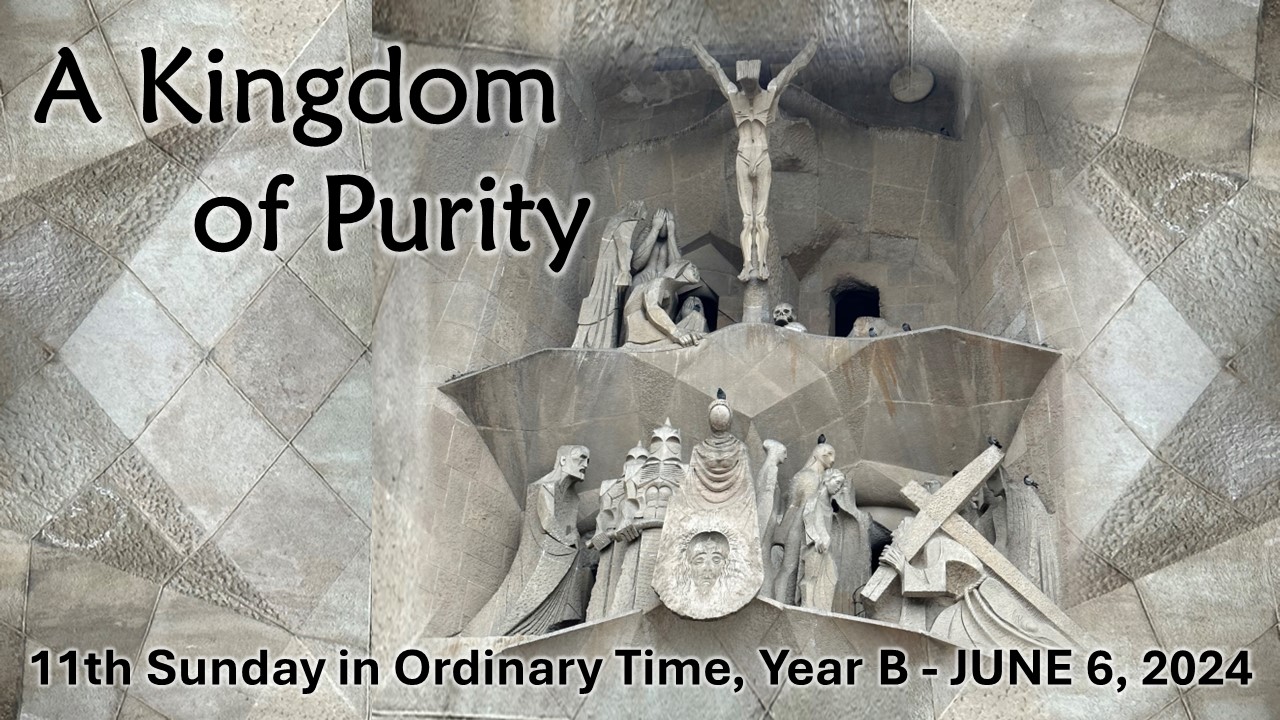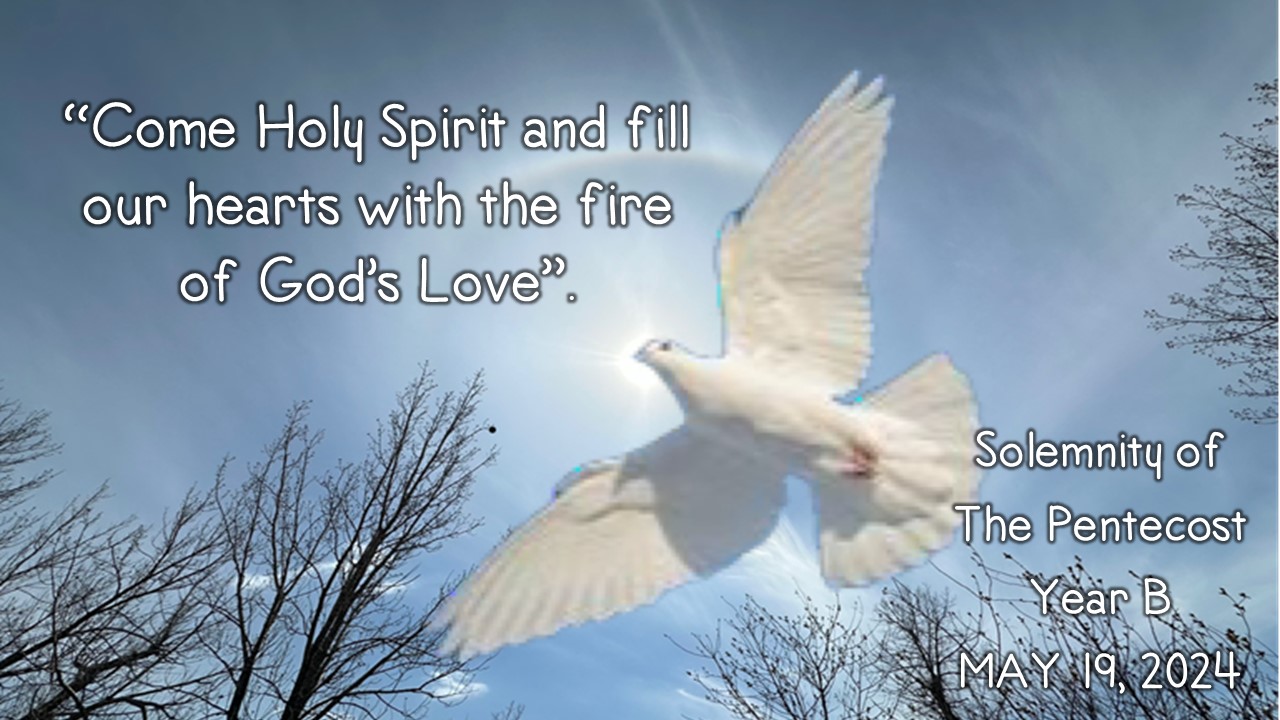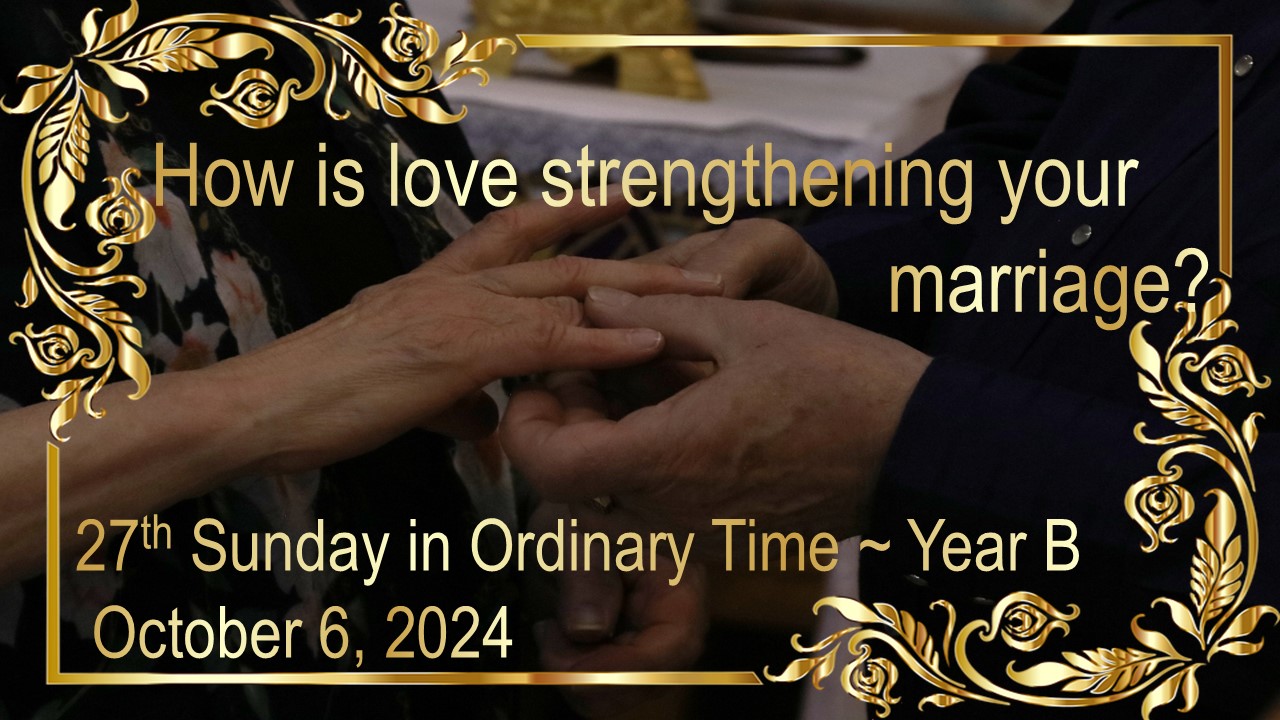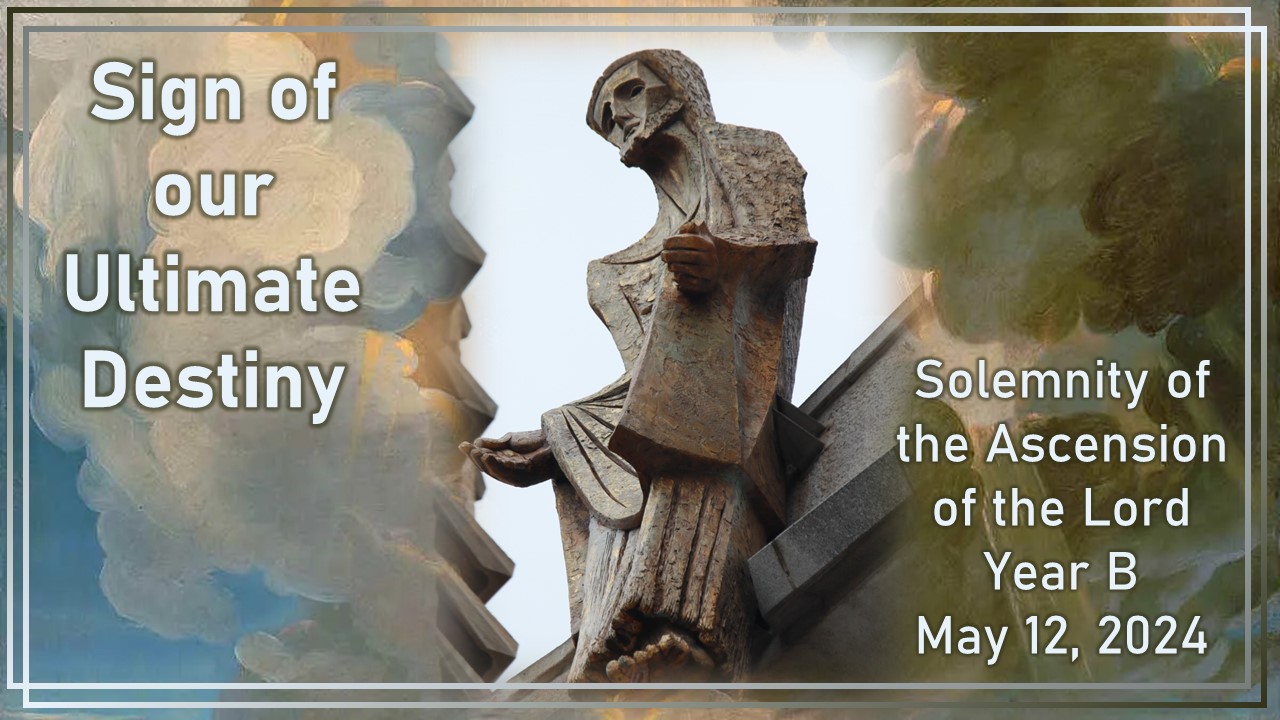
11th Sunday in Ordinary Time, Year B – JUNE 6, 2024
A KINGDOM OF PURITY
A few years ago, a group of salesmen went to a regional sales convention in Chicago. They had assured their wives that they would be home in plenty of time for Friday night’s dinner.
In their rush, with tickets and briefcases in hand, moving quickly through the airport terminal, one of these salesmen inadvertently kicked over a table which held a display of apples. Apples flew everywhere. Without stopping or looking back, they all managed to reach the plane in time for their nearly missed boarding.
All but one! He paused, took a deep breath, quickly assessed the situation — and experienced a twinge of compassion for the girl whose apple stand had been overturned. He told his buddies to go on without him, waved good-bye, told one of them to call his wife when they arrived at their home destination and explain his taking a later flight. Then, he returned to the terminal where the apples were still all over the terminal floor.
The man was glad he did. The 16-year-old girl running the stand, he discovered, was totally blind! She was softly crying, tears running down her cheeks in frustration, all the while helplessly groping for her spilled produce as the rushing crowd swirled about her, no one stopping and no one caring for her plight.
No one else, that is. The salesman knelt on the floor with her, gathered up the apples, put them back on the table and helped organize her display. As he did this, he noticed that many of them had become battered and bruised. These he set aside in another basket.
When he had finished, he pulled out his wallet and said to the girl, “Here, please take this $40 for the damage we did. Are you okay?” She nodded through her tears. “I hope we didn’t spoil your day too badly,” he said.
As the salesman started to walk away, the bewildered blind girl called out to him, “Mister…” He paused and turned to look back into those blind eyes. She continued, “Are you Jesus?”
He stopped in mid-stride, and he wondered, stunned by the words. Then slowly, he made his way to catch the later flight with that question burning in his soul: “Are you Jesus?”
That’s what we are called be a pure kingdom by becoming Jesus to other. The examples of saints in our faith can help us walk on the path of purity and sincerity to become Jesus to other. In the Book of Revelation (chapters 2 &3) we read about the messages given to seven churches with encouragement and warning to look deeper into our relationship with the promise of crown of eternal life. The people who keep the commandments and statutes of the Lord are compared to a tree planted near the streams of living water whose leaves never wither nor they get tired of bearing fruit. (See Jeremiah 17:5-11, Psalm1:1-8, Revelation 22).
On this eleventh Sunday of ordinary time, we are reminded that, as part of God’s kingdom, the church of Christ is like a tree planted by God in the world. From the smallest of all seeds, she becomes the noblest of trees and fills the earth. She is the physical evidence of God’s kingdom. So, like the birds of the air, we are called to make our home in her.
The first reading is a message of hope and restoration. Through the prophet Ezekiel God promised to re-establish and elevate his people who were in exile in Babylon. Yet, during this prolonged despair, the prophet instilled them with a message of hope. He uses the metaphor of small shoot which is like Isaiah’s image of the stump of Jesse, to describe the revitalisation of Israel. “I will plant it (the shoot) myself on the high mountain of Israel. It will sprout branches and bear fruit”. The shoot here refers to God’s faithful remnants who remained steadfast during adversity and who in turn formed the nucleus of Israel after the exile. It was out of these faithful remnants that God’s Anointed would emerge. This means that God wishes to transfer his people from a kingdom of oppression, poverty and misery to a kingdom of justice, prosperity and peace of mind. The people who believe in the Kingdom of God are like the tree planted near the streams of water as we read in Psalm 1:1-8, Jeremiah 17:5-14, and Revelation 22. This is obviously the kingdom, where Christ reigns as king and, as the fountain of life. This is the kingdom where God wishes us to be. The church is the visible sign of this noble cedar or kingdom that gives refuge to all people.
The Kingdom of God begins with the realization of our relationship with Him. Once we realize that we are the Kingdom, then there are life changing occurrences happen; we love, we care, we support and we trust in the Lord who died on the cross for us to give us eternal life. Let me share another story with all of you.
Once upon a time there was a seed buried in the mud. It was in dark blackness. It was cold and wet. It shivered. It was just plain no fun. It was icky. It was dirty. It was muddy. It was mucky. It was stuck in the mud. How it got there is a little 3 sentence story. One nice breezy fall day, it had fallen on the ground. Then it rained a little. And a deer came along and stepped on it and pushed it deep in the mud. Life just wasn’t fair. It was all alone. If only it had fallen like the other seeds in the grass, or on the log over there, or at least not been stepped on. But what the little seed did not see was the mouse that ate the seeds in the grass and the bird that ate the seeds on the log and the chipmunk that gathered the seeds on the ground to store and eat all winter long. It couldn’t see this because it was stuck in the mud. It didn’t know how lucky it was.
Now besides being squished tight in the mud, it was also locked in its shell. It tried to get out of its terrible predicament, but the Fall days got shorter and shorter. It got colder and colder too. It had no strength to get out of its shell. The mud was frozen solid, the deep snow covered it. It went through a terribly cold and dark winter. Finally, after what seemed forever, slowly the days grew a little longer, a little warmer. The seed had work to do. It began to grow. The water in the mud had softened its shell. Still, how hard it was to get out of its shell! It had to exert energy like never before. It struggled and struggled. Finally, it broke free. Then it used more energy to go not up, but down, struggling to send a tiny little root through that compacted mud — that terribly icky place. It needed something to tightly hold on to, because………..now it had to struggle yet again with great effort to send a tiny little shoot to the light above — through all that icky mud. Finally, it was free. It reached the warm sunlight.
You would think its troubles were over. Not so fast. In a whole year it grew only a few inches, while the other plants grew by leaps and bounds, as if to mock the little seed. Every fall it lost its leaves. In winter it barely survived, covered with snow. And as it got a little taller, it had to go through windstorms and blizzards. But one thing was peculiar. Even while it slowly grew up to the sunny blue sky, it never forgot its roots. It had the wisdom to keep growing its roots deeper and deeper in the mud. In fact, it used every windstorm, every blizzard, every shaking, every vibration to wiggle its roots deeper and deeper into the black icky mud. It knew the importance of a solid foundation, because it always remembered where it came from, how it had been protected and helped by the mud.
The years rolled on, and the seasons too. Each summer it so slowly but surely grew. Each winter it became a little tougher and stronger. It had little joys and little sorrows throughout its life like all of us do. Then came the fiercest of all storms. The wind blew so violently this way and that. Trees all around were dashed to the ground, broken, uprooted, a jangled mess. After the devastation, the sun shone once again. To be sure, it didn’t look so pretty, some leaves were missing, in fact, quite a few, but that would soon be remedied. Because it hadn’t forgotten its roots as a seed in the mud, it stood there in all its glory. It had become the mighty oak tree. Are we forgetting our roots as a Kingdom of God?
In the second reading, Paul reminds us of the fact that we are on a journey towards the kingdom of God to be with Christ our lord and king. Hence, whether we are “living in the body or exiled from it, we should be focused on pleasing the Lord.
The journey to this kingdom is a journey which must be approached with faith and courage. Hence Paul reminds us: “…Going as we do by faith and not by sight, we are full of confidence…and actually want to leave this body in order to be with Christ.” Considering this, we must advance diligently in order to be admitted into this kingdom by Christ. We are always Christians 24/7 and 365 days a year and St. Paul reminds us in this way “So whether we are at home or away, we make it our aim to please him. For all of us must appear before the judgment seat of Christ, so that each may receive recompense for what he or she has done in the body, whether good or evil”.
Today’s Gospel is composed of two very brief parables: that of the seed that sprouts and grows on its own, and that of the mustard seed. Through these images taken from the rural world, Jesus presents the efficacy of the Word of God and the requirements of his Kingdom, showing the reasons for our hope and our commitment in history.
Two seeds lay side by side in the fertile spring soil. The first seed said, “I want to grow!” I want to send my roots deep into the soil beneath me and thrust my sprouts through the earth’s crust above me. I want to unfurl my tender buds like banners to announce the arrival of spring. I want to feel the warmth of the sun on my face and the blessing of the morning dew on my petals!” And so, she grew? The second seed said, “I am afraid. If I send my roots into the ground below, I don’t know what I will encounter in the dark. If I push my way through the hard soil above me, I may damage my delicate sprouts. What if I let my buds open, and a snail tries to eat them? And if I were to open my blossoms, a small child may pull me from the ground. No, it is much better for me to wait until it is safe.” And so, she waited? A yard hen, scratching around in the early Spring ground for food, found the waiting seed and promptly ate it. What do we want to become, all depends on us? The Kingdom of God starts with the realization of our role as Christians. Anyone can start from now and make a brand-new ending. There isn’t a promise of days without pain, laughter without sorrow, sun without rain, but it can promise strength for the day, comfort for the tears, and light for the way. Disappointments are like road bumps; they slow you down a bit but you enjoy the smooth road afterwards. Don’t stay on the bumps too long. Move on! When you feel down because you didn’t get what you want, just sit tight, and be happy. There’s a purpose to life’s events, to teach you how to laugh more or not to cry too hard. You can’t make someone love you, all you can do is be someone who can be loved, and the rest is up to the person to realize your worth. It’s better to lose your pride to the one you love, than to lose the one you love because of pride. We spend too much time looking for the right person to love or finding fault with those we already love, when instead we should be perfecting the love, we give.
Holy Father Pope Francis explains the parables in an amazing way: In the first parable, attention is placed on the fact that the seed scattered on the ground takes root and develops on its own, regardless of whether the farmer sleeps or keeps watch. He is confident in the inner power of the seed itself and in the fertility of the soil. In the language of the Gospel, the seed is the symbol of the Word of God, whose fruitfulness is recalled in this parable. As the humble seed grows in the earth, so too does the Word by the power of God work in the hearts of those who listen to it. God has entrusted his Word to our earth, that is to each one of us with our concrete humanity. We can be confident because the Word of God is a creative word, destined to become the “full grain in the ear”. This Word, if accepted, certainly bears fruit, for God Himself makes it sprout and grow in ways that we cannot always verify or understand. All this tells us that it is always God, it is always God who makes his Kingdom grow. That is why we fervently pray “thy Kingdom come”. It is He who makes it grow. Man is his humble collaborator, who contemplates and rejoices in divine creative action and waits patiently for its fruits.
The Word of God makes things grow, it gives life. And here, I would like to remind you once again, of the importance of having the Gospel, the Bible, close at hand. A small Gospel in your purse, in your pocket and to nourish yourselves every day with this living Word of God. Read a passage from the Gospel every day, a passage from the Bible. Please don’t ever forget this. Because this is the power that makes the life of the Kingdom of God sprout within us.
The second parable uses the image of the mustard seed. Despite being the smallest of all the seeds, it is full of life and grows until it becomes “the greatest of all shrubs”. And thus is the Kingdom of God: a humanly small and seemingly irrelevant reality. To become a part of it, one must be poor of heart; not trusting in their own abilities, but in the power of the love of God; not acting to be important in the eyes of the world, but precious in the eyes of God, who prefers the simple and the humble. When we live like this, the strength of Christ bursts through us and transforms what is small and modest into a reality that leavens the entire mass of the world and of history.
An important lesson comes to us from these two parables: God’s Kingdom requires our cooperation, but it is above all the initiative and gift of the Lord. Our weak effort, seemingly small before the complexity of the problems of the world, when integrated with God’s effort, fears no difficulty. The victory of the Lord is certain: his love will make every seed of goodness present on the ground sprout and grow. This opens us up to trust and hope, despite the tragedies, the injustices, the sufferings that we encounter. The seed of goodness and peace sprouts and develops, because the merciful love of God makes it ripen.
The kingdom he invites us to, is a simple and peaceful one. It is open to all who seek it with a sincere heart. The easiest way to enter it is by sowing a seed of faith in Christ. This is the key. Faith grows and when it does, it achieves great things. As it grows it leads us to Christ and consequently to his kingdom. Also, our faith draws others to Christ and to his church, the visible sign of God’s kingdom on earth. As Christ says: “The birds of the air come to take shelter under its branches.”
How does our faith draw others to Christ? When we demonstrate or bear a good testimony of our individual and collective faith, the result is great. Lives could be touched and transformed. A few persons might come to believe in God. This consequently leads to the growth of the church, the visible sign of God’s kingdom on earth. As our faith grows, the church, the body of Christ grows and more people are drawn into the comfort of God’s kingdom.
As we all walk together with Diocese of Calgary to plan our Parish Renewal to help people encounter Christ, become missionary disciples and strengthen our family life, today’s word of God is very important to remember that we need to work together to build a pure kingdom of God on earth.
There once was a man who had two servants. One day a disagreement arose between them as to who was the greatest in the eyes of their master. So, they went to the master of the house and asked him, “My lord, which of us is greater?”
The master of the house replied, “I will let you discover that for yourself. I will ask each of you a question and you must answer truthfully.” So, the servants stood before him, and he started to question them. To the first servant, he asked, “What do you do for me?” “Sir, I work in the fields all day long to grow wheat for my lord’s granary,” the first servant replied. “Then, at night, I go through the house and fill all the lamps so that my lord will have light. For this you pay me a wage, but I hope that one day that I may earn my freedom.”
The master nodded his head. He turned to the second servant and asked, “And what do you do for me?” “Sir,” he replied, “I am an educated man. I am well-versed in literature, music, mathematics and science. I teach your children all that I know so that one day they may leave your house and make a success in the world. And when they do, I hope that you will grant me my freedom. In the meantime, you give me a wage for what I do. Again, the master nodded. Then he turned to a lowly slave who was standing nearby, and asked, “And what do you do for me?”
“You know that I love you, my lord, and my only wish is to do whatever you ask,” the slave answered without hesitation. “You bought me, and I know that I will be a slave for life, therefore I earn no wage. But you are kind and merciful to me, and do not beat me as other masters beat their slaves. You are wise and just and kind and that is why I love you.” The master of the house smiled. “Then you are the greatest of all my servants and I will make you a free man.”
When they heard this, the two servants were shocked. “Why him?” they cried. “We do much more work than he does. He waits around for you to give him an order, but we labor in your fields without orders, teach your children, and light your lamps. We work unceasingly and should be rewarded.” “Yes,” the master of the house replied. “You do work in my fields and do all the other things that you said. But this man wants only to serve me, not himself. He waits patiently until I tell him what I want him to do. His faithfulness has never failed him. He now has his reward — his freedom. And I will place him as overseer, and you will be his servants. Because of his faithful service to me — though he was once a lowly slave — he is truly the greater.”
How do we grow in purity to build God’s kingdom on earth?
Other Sermons In This Series

Solemnity of Pentecost – Year B ~ MAY 19, 2024
May 16, 2024

27TH SUNDAY IN ORDINARY TIME YEAR B ~ OCTOBER 6, 2024
October 03, 2024


